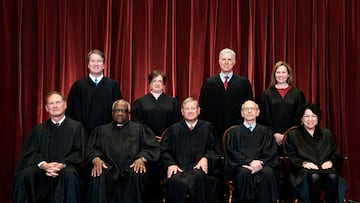700K sign petition for Clarence Thomas to be impeached. Can a Supreme Court justice be impeached?
Following some recent high profile controversial judgements from a right-leaning SCOTUS, questions are being asked about their life terms.

The landmark ruling of Roe v Wade was overturned in June by the sitting Supreme Court of the United States. Nine justices preside over the decisions of the highest court in the country - currently heavily stacked to the right thanks to some political manoeuvres over recent decades - and the latest controversy has people asking whether or not the apparent position until death can actually be ended with impeachment.
SCOTUS justices are pro-life terms
The truth is that as custodians of the US Constitution, they will be all too aware of the right through the document for them to be impeached if found appropriate. In it is clearly stated that the US president, along with the vice president and all US civil officers are subject to impeachment, which includes the Supreme Court justices. In fact, over the history of the court 15 judges being impeached by the House of Representatives, with eight of those being convicted in the Senate. The first of those to be removed from office was way back in 1804, when John Pickering was convicted on charges of mental instability and intoxication on the bench, while the most recent was G. Thomas Porteous Jr, who was forced out in 2010 on charges of accepting bribes and making false statements under penalty of perjury.
One of the arguments being put forward for the impeachment of some of the judges this time around is that they lied under oath.
Impeachment “should be very seriously considered” for at least two Supreme Court justices, said Rep. Alexandria Ocasio-Cortez about those who voted in favor of overturning Roe v.Wade, arguing that “they lied” at their confirmation hearings, continuing that, “there must be consequences for such a deeply destabilizing action and hostile takeover of our democratic institutions.”
Senator Susan Collins was another to speak out, highlighting the conflicting positions that justices Brett Kavanaug and Neil Gorsuch had taken pre- and post- taking up their roles, having expressed the importance of supporting judicial precedents, not only at their public testimony but also in private meetings.
“Throwing out a precedent overnight that the country has relied upon for half a century is not conservative,” the Maine senator said in a statement. “It is a sudden and radical jolt to the country that will lead to political chaos, anger, and a further loss of confidence in our government.”
Someone else who was “alarmed” at the change to the law was West Virginian Senator Joe Manchin. He had listened to both Brett Kavanaug and Neil Gorsuch when they testified under oath that Roe v Wade was settled legal precedent, before voting for them.
Justice Clarence Thomas in the public dock
A petition has been raised questioning one justice in particular, Justice Clarence Thomas, and it has received over 700,000 signatures. The argument against him in the petition is that he “has shown he cannot be an impartial justice,” pointing to comments he made on the January 6 Capitol riots as well as those on Roe-Wade.
An extra concern across the US is that Thomas has called on the Supreme Court to reconsider other rights previously covered in “substantive due process.” This has people worried that, just as with abortion, we may see an overruling of the right to contraception (Griswold v Connecticut); the right to same-sex marriage (Obergefell v Hodges); and the right to same-sex intimacy (Lawrence v Texas).
Could any justices be removed over Roe v Wade?
The most likely answer to the question of the justices being removed, or even impeached, over lying under oath, or something similar, for this case is ‘no’. The US constitution states that “Judges, both of the supreme and inferior Courts, shall hold their Offices during good Behaviour.”
Although nothing can be deemed to be certain right now, the general consensus is that the statements made by the likes of Justice Thomas and others have been very carefully structured, thus unlikely to be at risk of committing perjury.






